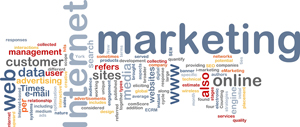
Small business owners now have additional marketing opportunities via the Internet. Sometimes the opportunity feels like a burden as busy entrepreneurs try to juggle their time and resources to maximize their exposure and client engagement. Let's try to streamline the process of your social media strategy.
The goal is to spend the right amount of time on the right platforms to reach your customers. Who are your best customers and where do they hang out online? You know your customer; you know your schedule; you know your technical ability level. Take these three factors into account when designing your social media strategy:
Facebook:
Most of the world has a Facebook page. Have you taken the time to use Facebook for your business by creating a Facebook fan page? The cool thing about fan pages is that you can have an unlimited number of followers, whereas on your personal Facebook page you are limited to 5,000 "friends."
On your fan page, there is a place to invite your Facebook friends to "like" your fan page. The fanpage is where you can heavily promote your business. On your company's Facebook fan page, be interesting,but focused on sharing information about your business and your industry. Share your opinions, snippets of conversations with clients, and what you are learning about professionally. Also, promote your services and seminars. Join some groups that relate to your industry ortarget market. Try to spend no more than ten minutes on your friend page and your fan page every week day. Keep focused on how it helps you find clients. Whatever you do, don't get drawn into the Facebook time-sucking vortex!
When it comes to social media and promoting your business, there is a risk that you might try to use too many platforms and burn out. It is easy to spend too much time on the social part of social media, and not enough time on the reason you are there, which is to attract clients. I recommend adopting Twitter as a business strategy only for those avid information junkies who can handle their ADD tendencies. Twitter takes a bit of training to understand how to use it. It is similar to Facebook, but the platform is much less intuitive and much faster paced. Your followers will expect you to actively tweet throughout the day, if possible. Business owners who love Twitter have become adroit at its nuances. They can be considered addicted to the constant, high-volume information and feedback. There would be a world-wide revolt if Twitter was taken off the web. Nevertheless, it is not for every business owner.
LinkedIn:
As a business owner, you should have a profile on LinkedIn. Not having a LinkedIn business account is like not having a website. It can lead consumers to believe that you are not really legitimate. LinkedIn, like Facebook, allows you to create a profile, join groups, and post content to share with the members of your community. Unlike Facebook, there is a lot of professional courtesy, business networking and information sharing. On LinkedIn you can find people who actually want to engage in dialogue about your products or services. You can also create a separate Company Page on LinkedIn, similar in concept to the fan page on Facebook.
Fill out your profile fully, build your community, give and receive endorsements and recommendations (two different things), join and engage with a few groups related to your industry or target market, and post professional comments and your writings to share with your community. Try to post every weekday, or at least three or four times per week.
Google Business Profiles:
The Google Business Profile (GBP) area was formerly known as Google My Business. It evolved from Google+, which was a cross between Facebook and LinkedIn. It is highly recommended for business owners to create a Google Business Profile for their company, especially if they serve a local community and want to appear in the "local results" of Google Maps. GBP is fairly intuitive to use, especially if you use Gmail from Google. Like Facebook, there is a lot of sharing of useful visual information on a wide variety of topics. Like LinkedIn, the content is higher-level and does not include sharing personal details and events. A Google Business Profile helps business owners appease the "Google gods," since Google naturally favors content posted on its own platforms.
Bottom line:
Choose two or three platforms that attract your preferred clients to promote your business in a socially professional manner and get a return on your time investment.
Marketing Strategies For Your Business: Content Marketing | Social Media | Your Website | In Person